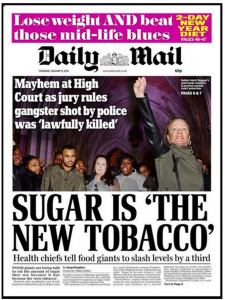And so it begins… the long march to effect entirely legitimate change.
With a strong and independent food regulator, the UK is the western democracy best placed to see this through. All strength to their arm – it’s going to be a doozy!
From Marion Nestle: http://www.foodpolitics.com/2014/01/action-on-sugar-to-the-food-industry-reduce-sugar-now/
Action on Sugar to the food industry: reduce sugar now!
A group of public health experts based mainly in Britain have announced a new anti-sugar campaign.
Called Action on Sugar, it is modeled on Great Britain’s campaign to get the food industry to gradually reduce salt in processed foods—voluntarily. That campaign is considered to have led to a reduction of 25% to 40%.
Action on Sugar’s objective: Reduce sugar in packaged foods by 20% to 30% over the next 3 to 5 years.
Action on Sugar is a group of specialists concerned with sugar and its effects on health. It is successfully working to reach a consensus with the food industry and Government over the harmful effects of a high sugar diet, and bring about a reduction in the amount of sugar in processed foods. Action on Sugar is supported by 18 expert advisors.
As one of the experts put it, “Everywhere, sugary drinks and junk foods are now pressed on unsuspecting parents and children by a cynical industry focused on profit not health”—just like the tobacco industry behaves.
You have to love the British press:

Source: http://www.actiononsugar.org/
• To reach a consensus with the food manufacturers and suppliers that there is strong evidence that refined added sugar is a major cause of obesity and has other adverse health effects.
• To persuade the food processors and suppliers to universally and gradually reduce the added sugar content of processed foods.
• To ensure clear and comprehensive nutritional labelling of added sugar content of all processed foods and beverages, using the recommended traffic light system.
• To educate the public in becoming more sugar aware in terms of understanding the impact of added sugar on their health, checking labels when shopping and avoiding products with high levels of added sugar.
• To ensure that children are highlighted as a particularly vulnerable group whose health is more at risk from high added sugar intakes.
• To ensure the body of scientific evidence about the dangers of excessive refined added sugar consumption becomes translated into policy by the Government and relevant professional organisations.
• To conduct a Parliamentary campaign to ensure the Government and Department of Health take action, and that, if the food industry do not comply with the sugar targets, they will enact legislation or impose a added sugar tax.
• To work with other organisations and stakeholders in order to maximise the message about what is a healthy diet, ensuring this includes reducing the current national high added sugar intake.
• To work with experts in individual countries, the World Health Organisation (WHO) and individual ministries of health and other relevant bodies.
